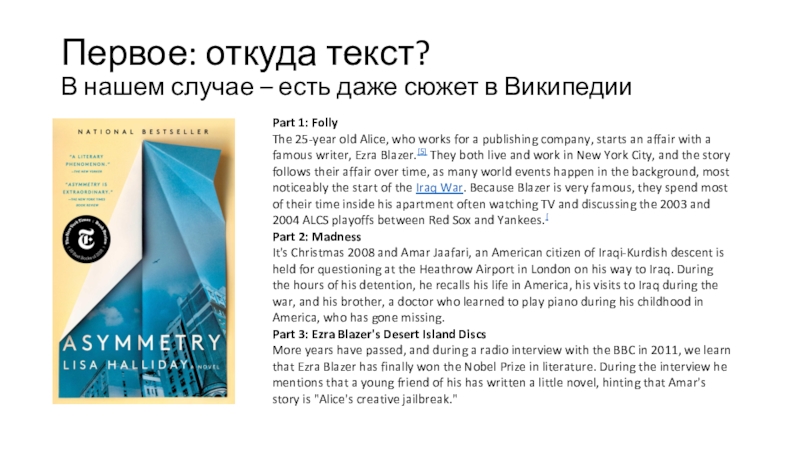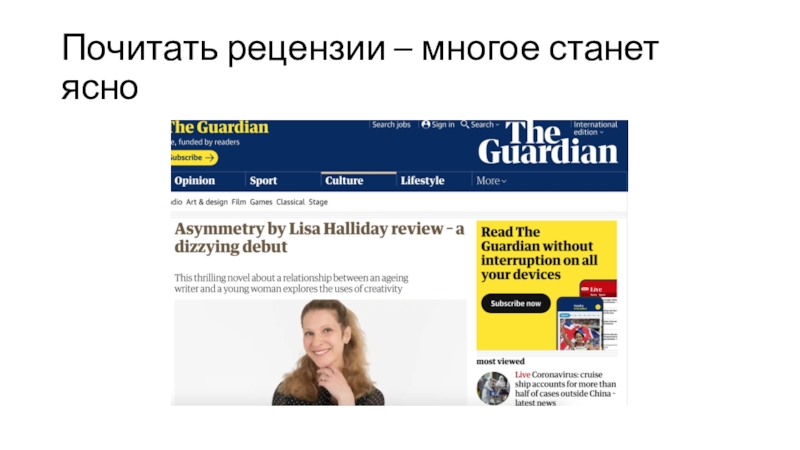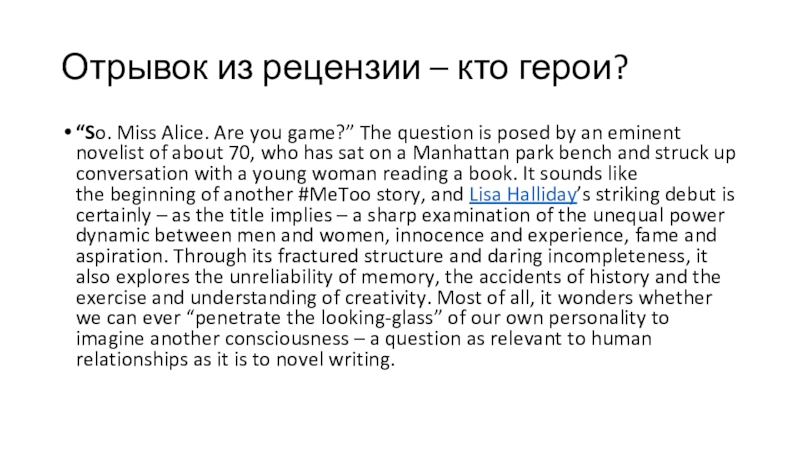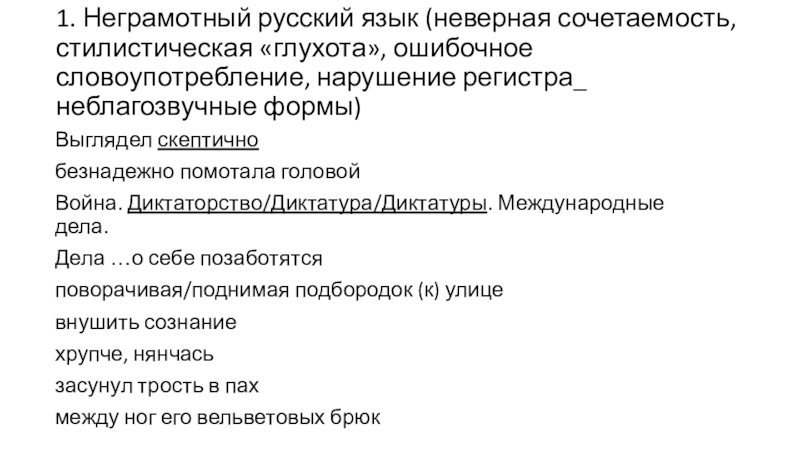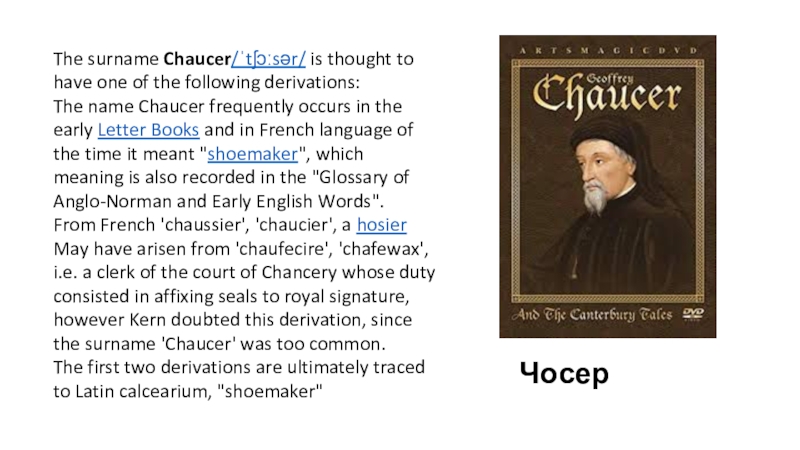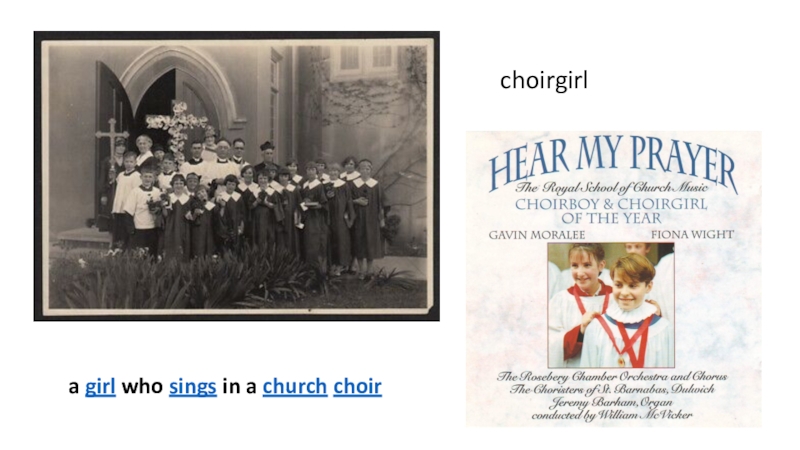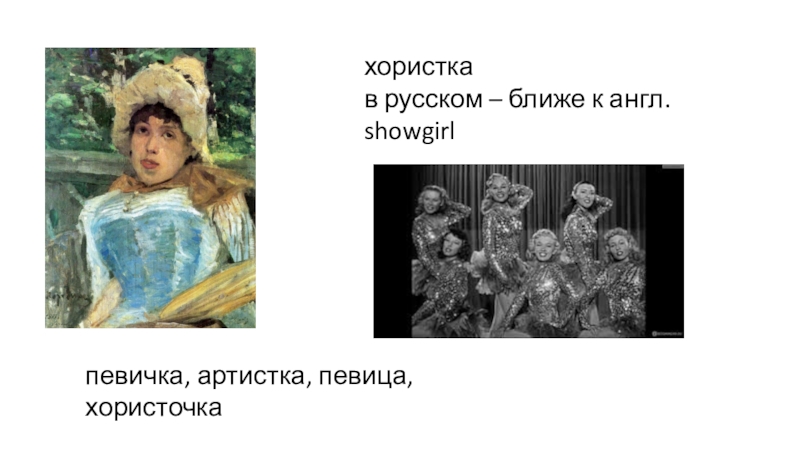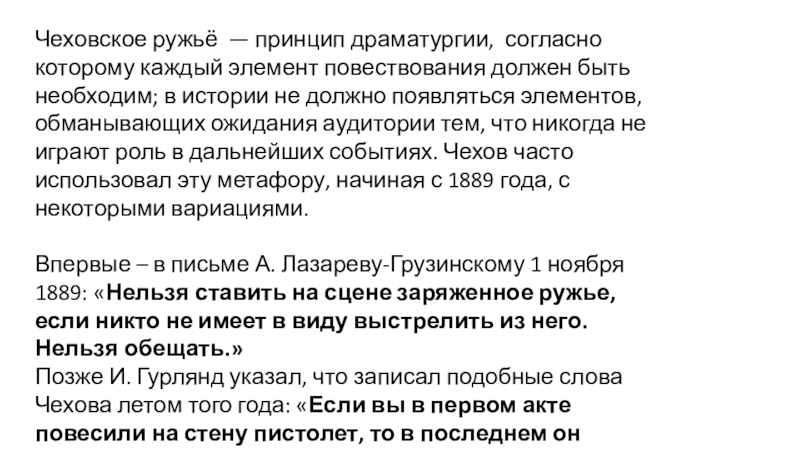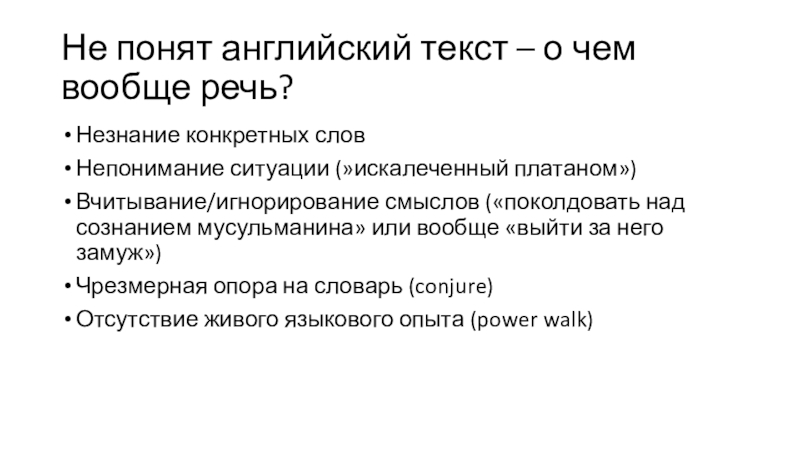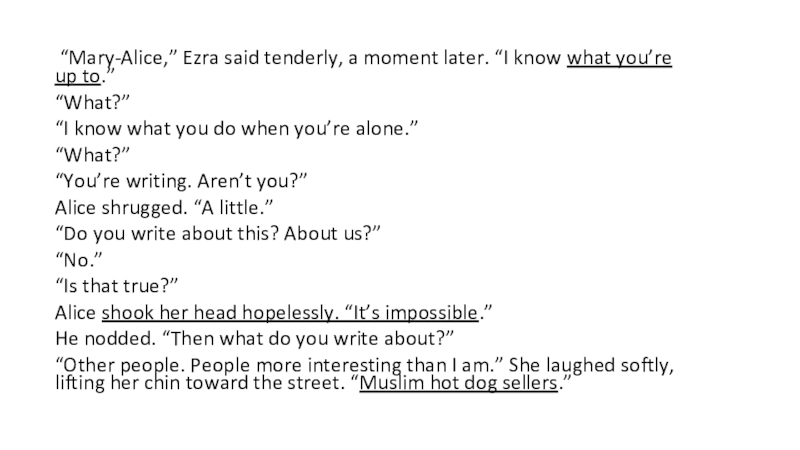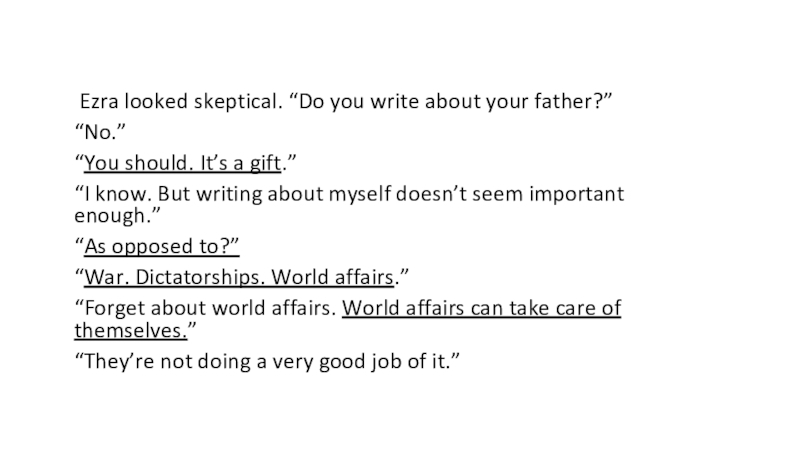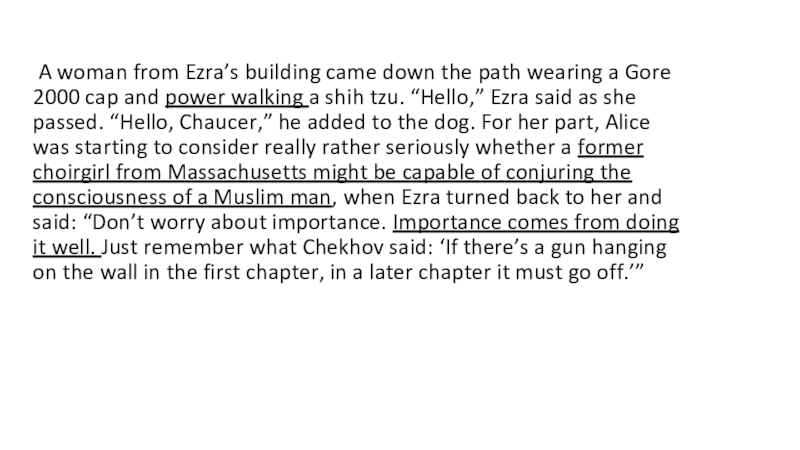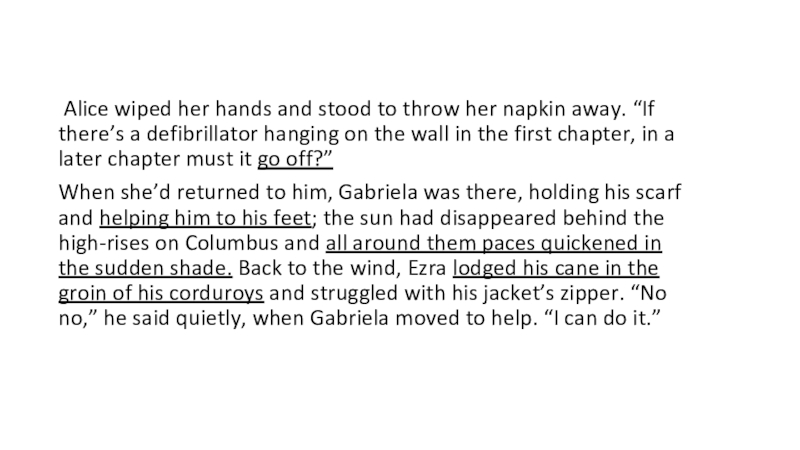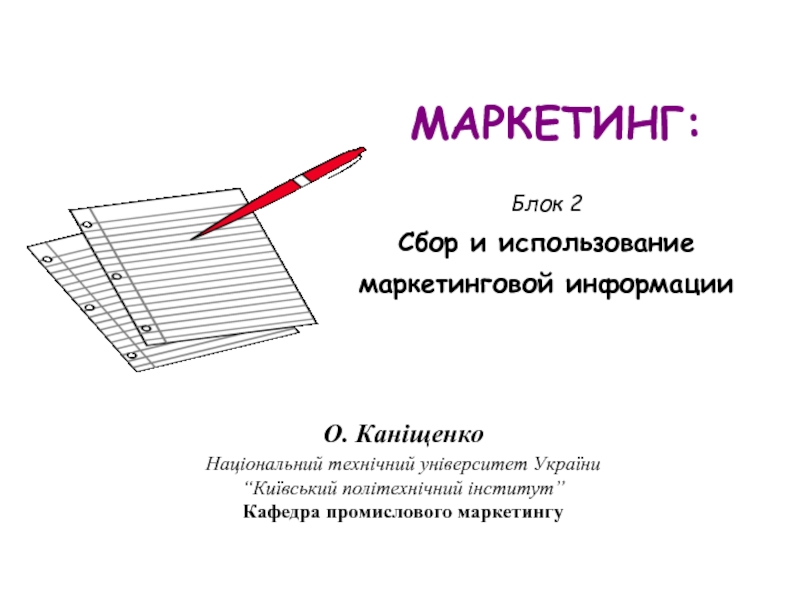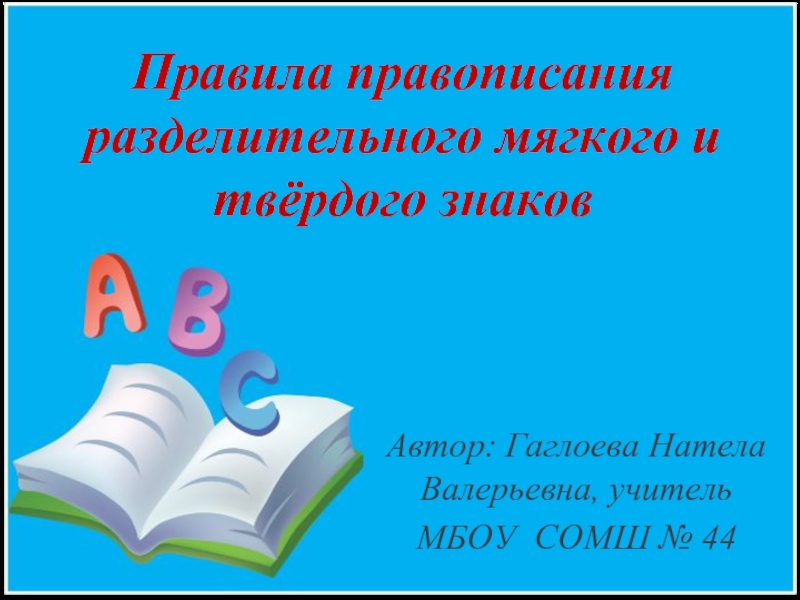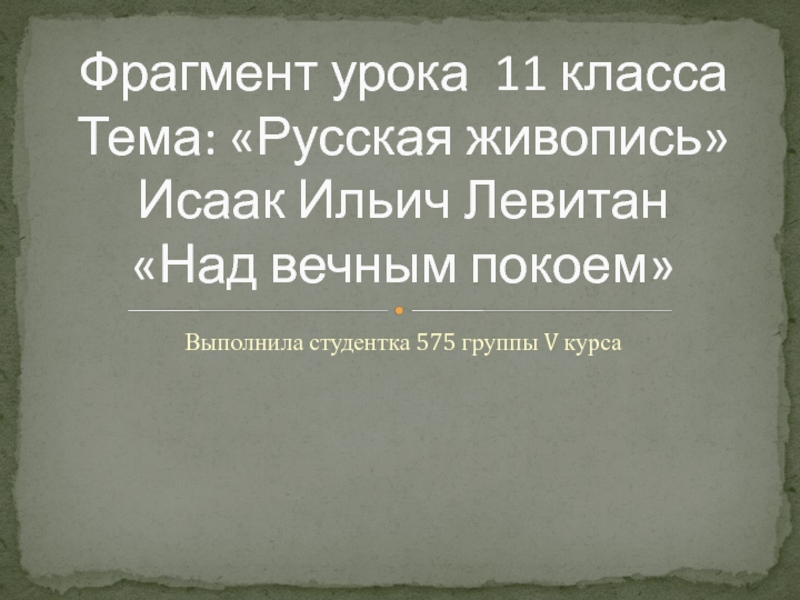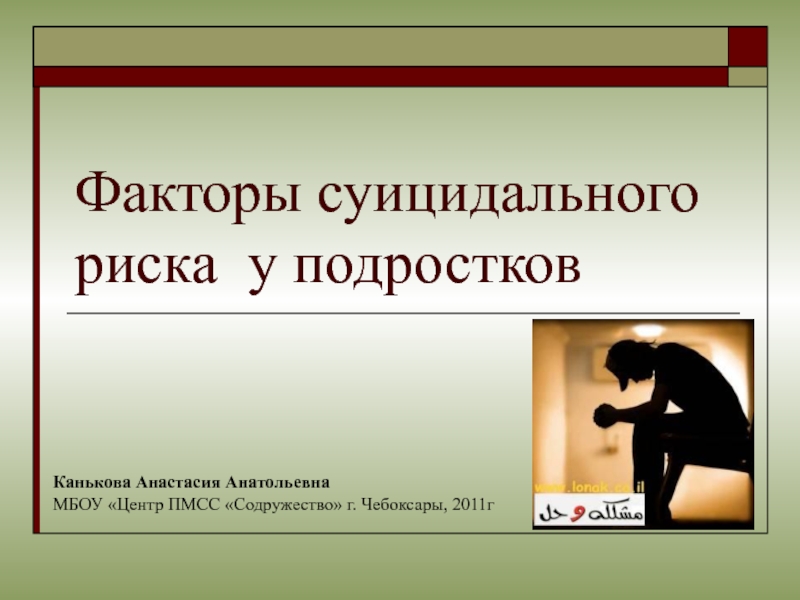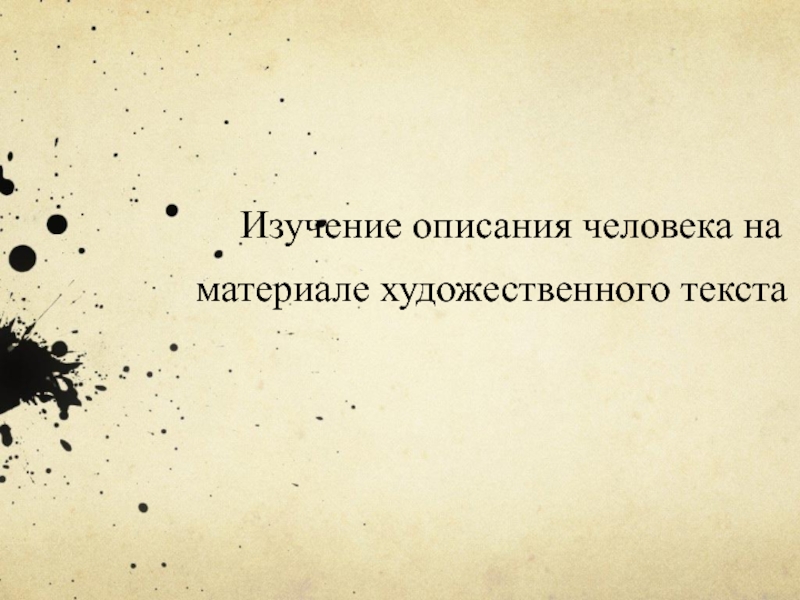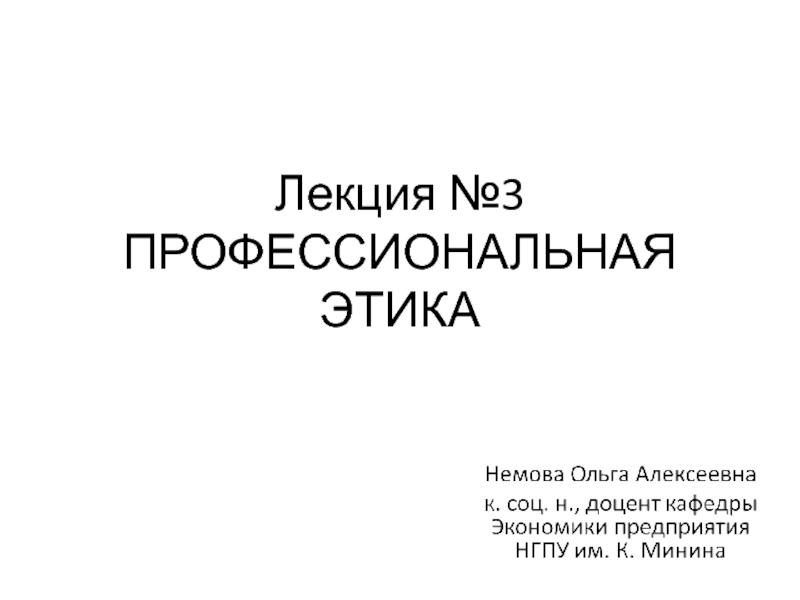Разделы презентаций
- Разное
- Английский язык
- Астрономия
- Алгебра
- Биология
- География
- Геометрия
- Детские презентации
- Информатика
- История
- Литература
- Математика
- Медицина
- Менеджмент
- Музыка
- МХК
- Немецкий язык
- ОБЖ
- Обществознание
- Окружающий мир
- Педагогика
- Русский язык
- Технология
- Физика
- Философия
- Химия
- Шаблоны, картинки для презентаций
- Экология
- Экономика
- Юриспруденция
Разбор полетов (английский текст)
Содержание
- 1. Разбор полетов (английский текст)
- 2. Первое: откуда текст? В нашем случае –
- 3. Почитать рецензии – многое станет ясно
- 4. Отрывок из рецензии – кто герои?“So. Miss
- 5. Основные проблемы(самые частотные)
- 6. 1. Неграмотный русский язык (неверная сочетаемость, стилистическая
- 7. 2. Незнание реалий - лучше один раз
- 8. Columbus Circle, NY
- 9. Слайд 9
- 10. Слайд 10
- 11. The surname Chaucer/ˈtʃɔːsər/ is thought to have one of
- 12. choirgirla girl who sings in a church choir
- 13. певичка, артистка, певица, хористочкахористка в русском – ближе к англ.showgirl
- 14. Чеховское ружьё — принцип драматургии, согласно которому каждый элемент
- 15. Plane tree:«платан» или «чинара»?
- 16. Не понят английский текст – о чем
- 17. «Опасные места»Разбор текста
- 18. “Mary-Alice,” Ezra said tenderly, a moment later.
- 19. Ezra looked skeptical. “Do you write
- 20. A woman from Ezra’s building came down
- 21. Alice wiped her hands and stood
- 22. Спасибо за внимание
- 23. Скачать презентанцию
Первое: откуда текст? В нашем случае – есть даже сюжет в ВикипедииPart 1: FollyThe 25-year old Alice, who works for a publishing company, starts an affair with a famous writer, Ezra
Слайды и текст этой презентации
Слайд 1Разбор полетов
(английский текст)
«Читающий Петербург» 2019-2020
Городская библиотека им. В.В. Маяковского
21 февраля
2020
Слайд 2Первое: откуда текст? В нашем случае – есть даже сюжет в
Википедии
Part 1: Folly
The 25-year old Alice, who works for a
publishing company, starts an affair with a famous writer, Ezra Blazer.[5] They both live and work in New York City, and the story follows their affair over time, as many world events happen in the background, most noticeably the start of the Iraq War. Because Blazer is very famous, they spend most of their time inside his apartment often watching TV and discussing the 2003 and 2004 ALCS playoffs between Red Sox and Yankees.[Part 2: Madness
It's Christmas 2008 and Amar Jaafari, an American citizen of Iraqi-Kurdish descent is held for questioning at the Heathrow Airport in London on his way to Iraq. During the hours of his detention, he recalls his life in America, his visits to Iraq during the war, and his brother, a doctor who learned to play piano during his childhood in America, who has gone missing.
Part 3: Ezra Blazer's Desert Island Discs
More years have passed, and during a radio interview with the BBC in 2011, we learn that Ezra Blazer has finally won the Nobel Prize in literature. During the interview he mentions that a young friend of his has written a little novel, hinting that Amar's story is "Alice's creative jailbreak."
Слайд 4Отрывок из рецензии – кто герои?
“So. Miss Alice. Are you
game?” The question is posed by an eminent novelist of
about 70, who has sat on a Manhattan park bench and struck up conversation with a young woman reading a book. It sounds like the beginning of another #MeToo story, and Lisa Halliday’s striking debut is certainly – as the title implies – a sharp examination of the unequal power dynamic between men and women, innocence and experience, fame and aspiration. Through its fractured structure and daring incompleteness, it also explores the unreliability of memory, the accidents of history and the exercise and understanding of creativity. Most of all, it wonders whether we can ever “penetrate the looking-glass” of our own personality to imagine another consciousness – a question as relevant to human relationships as it is to novel writing.Слайд 61. Неграмотный русский язык (неверная сочетаемость, стилистическая «глухота», ошибочное словоупотребление,
нарушение регистра_ неблагозвучные формы)
Выглядел скептично
безнадежно помотала головой
Война. Диктаторство/Диктатура/Диктатуры. Международные дела.
Дела
…о себе позаботятсяповорачивая/поднимая подбородок (к) улице
внушить сознание
хрупче, нянчась
засунул трость в пах
между ног его вельветовых брюк
Слайд 72. Незнание реалий -
лучше один раз увидеть
Где происходит действие отрывка?
Что
за Gore 2000 на голове у женщины?
Кого эта женщина выгуливает?
Что
за имя у собаки?Чем Элис занималась в прошлом?
При чем тут Чехов?
О каких деревьях речь?
Слайд 11The surname Chaucer/ˈtʃɔːsər/ is thought to have one of the following derivations:
The
name Chaucer frequently occurs in the early Letter Books and in French
language of the time it meant "shoemaker", which meaning is also recorded in the "Glossary of Anglo-Norman and Early English Words".From French 'chaussier', 'chaucier', a hosier
May have arisen from 'chaufecire', 'chafewax', i.e. a clerk of the court of Chancery whose duty consisted in affixing seals to royal signature, however Kern doubted this derivation, since the surname 'Chaucer' was too common.
The first two derivations are ultimately traced to Latin calcearium, "shoemaker"
Чосер
Слайд 14Чеховское ружьё — принцип драматургии, согласно которому каждый элемент повествования должен быть
необходим; в истории не должно появляться элементов, обманывающих ожидания аудитории
тем, что никогда не играют роль в дальнейших событиях. Чехов часто использовал эту метафору, начиная с 1889 года, с некоторыми вариациями.Впервые – в письме А. Лазареву-Грузинскому 1 ноября 1889: «Нельзя ставить на сцене заряженное ружье, если никто не имеет в виду выстрелить из него. Нельзя обещать.»
Позже И. Гурлянд указал, что записал подобные слова Чехова летом того года: «Если вы в первом акте повесили на стену пистолет, то в последнем он должен выстрелить. Иначе — не вешайте его.»
Слайд 16Не понят английский текст – о чем вообще речь?
Незнание конкретных
слов
Непонимание ситуации (»искалеченный платаном»)
Вчитывание/игнорирование смыслов («поколдовать над сознанием мусульманина» или
вообще «выйти за него замуж»)Чрезмерная опора на словарь (conjure)
Отсутствие живого языкового опыта (power walk)
Слайд 18 “Mary-Alice,” Ezra said tenderly, a moment later. “I know what
you’re up to.”
“What?”
“I know what you do when you’re alone.”
“What?”
“You’re
writing. Aren’t you?” Alice shrugged. “A little.”
“Do you write about this? About us?”
“No.”
“Is that true?”
Alice shook her head hopelessly. “It’s impossible.”
He nodded. “Then what do you write about?”
“Other people. People more interesting than I am.” She laughed softly, lifting her chin toward the street. “Muslim hot dog sellers.”
Слайд 19
Ezra looked skeptical. “Do you write about your father?”
“No.”
“You should.
It’s a gift.”
“I know. But writing about myself doesn’t seem
important enough.” “As opposed to?”
“War. Dictatorships. World affairs.”
“Forget about world affairs. World affairs can take care of themselves.”
“They’re not doing a very good job of it.”
Слайд 20 A woman from Ezra’s building came down the path wearing
a Gore 2000 cap and power walking a shih tzu.
“Hello,” Ezra said as she passed. “Hello, Chaucer,” he added to the dog. For her part, Alice was starting to consider really rather seriously whether a former choirgirl from Massachusetts might be capable of conjuring the consciousness of a Muslim man, when Ezra turned back to her and said: “Don’t worry about importance. Importance comes from doing it well. Just remember what Chekhov said: ‘If there’s a gun hanging on the wall in the first chapter, in a later chapter it must go off.’”Слайд 21
Alice wiped her hands and stood to throw her napkin
away. “If there’s a defibrillator hanging on the wall in
the first chapter, in a later chapter must it go off?”When she’d returned to him, Gabriela was there, holding his scarf and helping him to his feet; the sun had disappeared behind the high-rises on Columbus and all around them paces quickened in the sudden shade. Back to the wind, Ezra lodged his cane in the groin of his corduroys and struggled with his jacket’s zipper. “No no,” he said quietly, when Gabriela moved to help. “I can do it.”

